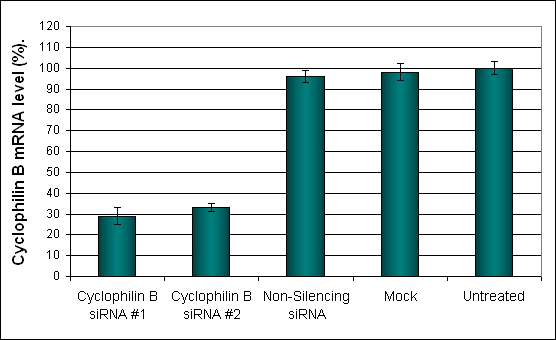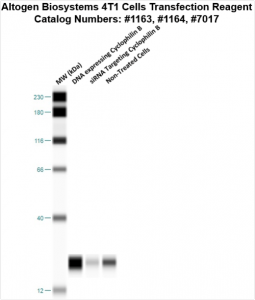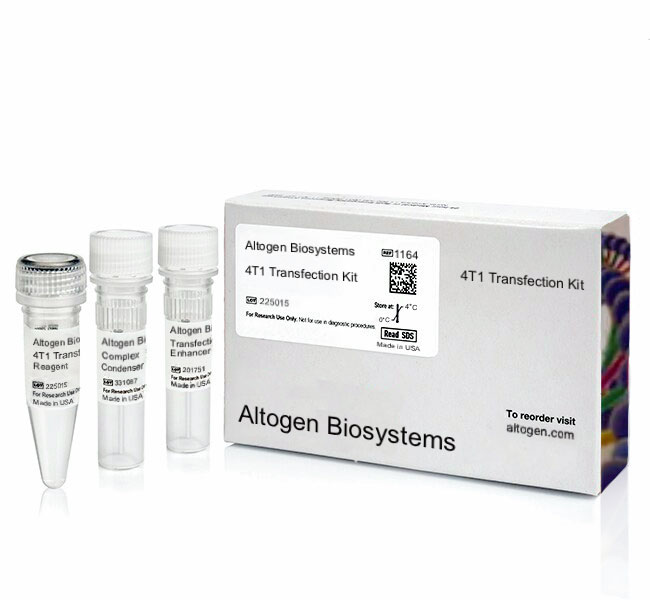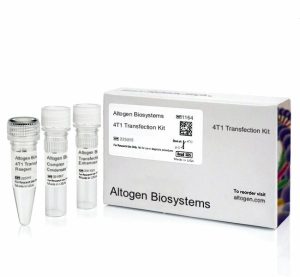Description
Purchase Orders: Click “Add to Cart” button to order, then email PO to orders@altogen.com.
Product Availability: In Stock.
Transfection Reagent for 4T1 Cells (Breast Cancer Cells, CRL-2539)
- Two component formulation enhances lipid mediated transfection efficiency
- Optimized easy-to-use transfection protocol provided for transfection of siRNA, DNA, mRNA, and microRNA
- Kit includes Transfection Enhancer reagent and recommended transfection protocol
- High transfection efficacy in the presence of serum
- Expand your RNAi application with a reagent optimized for delivery of both siRNA and plasmid
- Reproducible transfection results
- Works well for standard reverse transfection and high-throughput applications
- Download in vitro 4T1 transfection protocol: [PDF]
- Download 4T1 CRISPR/Cas9 transfection protocol: [PDF]
- Download PowerPoint presentation for 4T1 cells transfection kit: [PPT]
- UPC/GTIN/EAN: 860002089718
-
Brand: ALTOGEN®, developed and manufactured by Altogen Biosystems
Transfection Efficiency:
Reagent exhibits at least 67% transfection efficiency of siRNA delivery. Transfection efficiency was determined by real-time RT-PCR.
Product Description:
Enhanced transfection kit designed for superior efficiency in the 4T1 cell line, a model of breast cancer that is widely used in biomedical research. The 4T1 cell line is particularly valuable for studying breast cancer biology, metastasis, and drug response because it closely mimics the behavior of human breast cancer in terms of tumor growth, invasion, and metastasis to distant organs such as the lungs, liver, bone, and brain.
Transfection Protocol and SDS:
Download Altogen Biosystems 4T1 Transfection Protocol: [PDF]
Download SDS: [PDF]
4T1 Cell Line:
Triple-negative breast cancer is an uncommon subtype of breast cancer that lacks receptors for estrogen, progesterone, or HER2. It is an invasive type of cancer with limited treatment options. The 4T1 triple-negative cell line was established from the tumor of the mammary gland in a mouse (Mus musculus). This cell line was selected as resistant to 6-thioguanine without mutagen treatment. This type of tumor easily, and quickly spreads throughout the body of the mice it effects. This tumorigenic cell line exhibits epithelial cellular morphology. These cells are useful model in cancer research. The 4T1 cell line is especially valuable for stage IV human breast cancer studies since tumor from this cell line mimics human breast cancer and easily metastasizes through mice, making a suitable breast cancer model. The 4T1 murine breast cancer cell line is transplantable and has the ability to exhibit similar aggressive phenotype to the human breast cancer. Altogen Biosystems offers pre-optimized transfection kits for the 4T1 cell line.
4T1 is a mouse mammary carcinoma cell line that was originally isolated from a spontaneously arising tumor in a BALB/c mouse. This cell line is widely used as a preclinical model for studying breast cancer metastasis and testing potential cancer therapies. 4T1 cells are known for their high metastatic potential and ability to spontaneously metastasize from the primary tumor site to distant organs, such as the lung, liver, and bone. This makes them a valuable tool for studying the molecular mechanisms underlying breast cancer metastasis and identifying potential targets for anti-metastatic therapies. In addition to their high metastatic potential, 4T1 cells are also known for their resistance to chemotherapy and radiation therapy, which makes them useful for studying drug resistance mechanisms and testing novel therapeutic strategies. 4T1 cells can be grown as adherent monolayers or in suspension and are commonly used in both in vitro and in vivo studies. They have been used to study a wide range of biological processes, including cancer cell migration and invasion, tumor angiogenesis, and the interactions between cancer cells and the immune system. Overall, the 4T1 cell line is a valuable preclinical research model for studying breast cancer metastasis and testing potential cancer therapies, and has contributed significantly to our understanding of the molecular mechanisms underlying breast cancer progression and metastasis.
Data:

Figure 1. Cyclophilin B silencing efficiency was determined by qRT-PCR in the 4T1 cells transfected by Cyclophilin B siRNA or non-silencing siRNA control following the recommended transfection protocol. Cyclophilin mRNA expression levels were measured 48 hours post-transfection. 18S rRNA levels were used to normalize the Cyclophilin B data. Values are normalized to untreated sample. Data are presented as means ± SD (n=6).

Figure 2. Protein expression of Cyclophilin B in 4T1 cells. DNA plasmid expressing Cyclophilin B or siRNA targeting Cyclophilin B were transfected into 4T1 cells following Altogen Biosystems transfection protocol. At 72 hours post-transfection the cells were analyzed by Western Blot for protein expression levels (normalized by total protein, 10 µg of total protein loaded per each well). Untreated cells used as a negative control.
Selected in vivo transfection product citations (ALTOGEN® IN VIVO Transfection Kits used in the following publications):
- Nature. 2008 454(7203):523-7. Innate immunity induced by composition-dependent RIG-I …Saito et al [PDF]
- Am J Pathology. 2010 177(4):1870-80. Role of ocular complement factor H in a murine model … Lyzogubov et al [PDF]
- RNA. 2010 16(11):2108-19. RNase L releases a small RNA from HCV RNA that refolds … Malathi et al [PDF]
- Hypertension. 2014 63(2):353-61. Tissue transglutaminase contributes to … Liu et al [PDF]
- Jounal of Biological Chemistry. 2012 287(4):2907. Chaperoning of mutant p53 protein … Gogna et al [PDF]
- J Transl Med. 2010 15;8:133. Prevention of hyperglycemia-induced myocardial apoptosis … Zhang et al [PDF]
- Mol Cell Biol. 2013 33(7). SCO2 induces p53-mediated apoptosis by Thr845 phosphorylation … Madan et al [PDF]
Altogen Biosystems is a life sciences company that offers cell type-specific and pre-optimized transfection products, elecroporation kits, and in vivo delivery reagents. Advanced formulation of reagents and optimized transfection protocols provide efficient intracellular delivery of protein, DNA, mRNA, shRNA and siRNA molecules. Read more about transfection technology at Altogen’s Transfection Resource. Altogen Labs provides safety and efficacy preclinical research services. GLP-compliant studies for IND applications, and drug development, including over 90 in-house validated xenograft models, safety toxicology, etc (visit AltogenLabs.com).
Volume Options:
- 0.5 ml (Catalog #1163)
- 1.5 ml (Catalog #1164)
- 1.5 ml CRISPR (Catalog #2208)
- 8.0 ml (Catalog #7017)
Purchase Orders: Click “Add to Cart” button to order, then email PO to orders@altogen.com.
Product Availability: In Stock.






